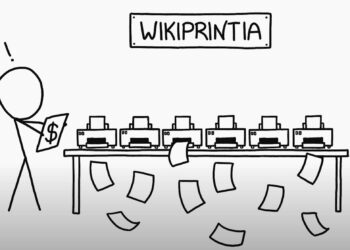
- Image by Aesum via Flickr
Everywhere we turn, we encounter debates over the risks and legality of uses of “private” data by social media mega-businesses like Facebook and Twitter.
Google is the latest culprit to be caught in the spotlight.
The lead technology piece in Saturday’s New York Times zeroed in on Google’s violation of German privacy laws, in connection with the company’s admission that it had systematically harvested private data from households in Europe and the US since 2006 — including email content and websites visited — in the course of capturing drive-by images for Google’s Street View photo archive.
There are already books to teach Internet privacy “survival skills” and software downloads to “erase” your data footprint. It won’t be surprising to find that some are willing to pay generously for services that sanitize their information shadows with virtual lye and steel wool. Privacy will be a scare commodity, and its market value will rise. When privacy becomes monetized, we may assign relative values to our own private information according to the type of information that is protected or made available.
While papers have touched on the potentially inverse relationship that exists between user privacy and the efficacy of Web 2.0 social ranking and recommendation engines, social media engines are only the beginning of what is to come.
For every product aimed at helping to protect information, there are exponentially more designed to extract and use your data. It’s hard to imagine that the pace and trajectory of these types of technologies will not surpass our ability to keep records and activities personal.
One of the great recent innovations in mobile technology — which will have a profound impact on the harnessing and re-use of personal data — is the use of sensors in handheld devices. In a section of their white paper, “Web Squared: Web 2.0 Five Years On,” Tim O’Reilly and John Battelle cover this in the section entitled, “Web Meets World: The ‘Information Shadow’ and the Internet of Things“:
Today’s smartphones contain microphones, cameras, motion sensors, proximity sensors, and location sensors (GPS, cell-tower triangulation, and even in some cases, a compass). These sensors have revolutionized the user interface of standalone applications. . . . But remember: mobile applications are connected applications. The fundamental lessons of Web 2.0 apply to any network application, whether web- or mobile phone-based (and the lines between the two are increasingly blurred). Sensor-based applications can be designed to get better the more people use them, collecting data that creates a virtuous feedback loop that creates more usage.
Beyond the information that is gathered, we must also consider where it resides and travels.
Cloud services for data storage and service provision, including content dissemination, are increasingly necessary for business. Individuals, using services for PC, iPhone, iPad, or other devices, are also turning more often to cloud services for storage, data back-up and retrieval, and information sharing. Examples of consumer cloud-based services are many — popular ones include Google Docs, Mozy, SharePoint, Rackspace, GoodReader, and Slideshare.
A quirky collective of entrepreneurs, business people, and digital thinkers have posted their kaleidoscopic look into the next 10 years of the Web on Slideshare.
Examples of the visions for the next decade:
- “Businesses will redefine virtually every internal process and . . . service they offer customers to leverage wireless access to information and contextual data to create new value for customers.” – Russ McGuire, VP Strategy, Sprint Nextel
- “People in developing nations will get online on mobiles before they do on PCs. . . . The mobile phone will become an enabler device, carrying users’ digital identities, preferences, and possessions around with them.” – Carlo Longino, Blogger, Mobhappy
- “Location will become THE core technology. . . . Nearly every user interaction with mobile devices will become location aware.” – Ted Morgan, CEO, Skyhook Wireless
- “Mobile payments will significantly replace currency [with cloud-based financial services managed by mobile device].” – Jonathan MacDonald, Founder, JME
- “The phone will become your doctor [using sensors to collect, transmit, and evaluate your health data].” – Steve O’Hear, Editor, last100
Regardless of whether one subscribes to these particular visions, two common themes are:
- Personal data, gathered via device, will be the coin of the realm
- Information will reside in and travel through remote hosting and service layers
In addition to what we put out there, businesses — including hospitals, financial centers, employers, airports, agencies, and the media — already gather our information, access it dynamically, and store it outside the confines of their own facilities. The data that we “control” through our own decision-making is only part of the story.
In 2008, IDC partnered with EMC to create the presentation, “The Diverse and Exploding Digital Universe: An Updated Forecast of Worldwide Information Growth Through 2011“:
We discovered that only about half of your digital footprint is related to your individual actions—taking pictures, sending e-mails, or making digital voice calls. The other half is what we call the ‘digital shadow’—information about you—names in financial records, names on mailing lists, web surfing histories or images taken of you by security cameras in airports or urban centers. For the first time your digital shadow is larger than the digital information you actively create about yourself.
By 2020, a significant portion of the Digital Universe will be centrally hosted, managed, or stored in public or private repositories we call “cloud services”. And even if a byte in the Digital Universe does not “live in the cloud” permanently it will, in all likelihood, pass through the cloud at some point in its life.
Anyone for an e-commerce start-up offering a PDF report on “your personalized digital shadow” for $39.95, or $59.95 with a mood ring app thrown in?
A comment from Tim O’Reilly posted on Web2forDev reflects on the changed state of the Web:
The Web is no longer a collection of static pages of HTML that describes something in the world. Increasingly, the Web is the world: everything and everyone in the digital world casts an “information shadow,” an aura of data which, when captured and processed intelligently, offers extraordinary opportunities and mind-bending implications.
We are just beginning to stretch the parameters of our experience, in which technology plays an increasingly integrated and experiential role. We should seek to re-examine the construct of privacy in light of the disruptive impact of technological change and adapt our expectations and management strategies to emerging paradigms.
Akin to Stephen Hawking’s recommended strategy for not confronting the extraterrestrial, our most prudent tactic may be to reduce our visibility versus seeking engagement.
For good measure, let’s start by assuming that they already know where we live.
Discussion
27 Thoughts on "The Digital Universe, Information Shadows, and Paying for Privacy"
Great topic Alix. It’s kind of an exciting, but precarious time. There are numerous advantages to the wealth of access to information that we have gained over the past decade, but it remains to be seen whether or not we can temper the ever-expanding opportunity with a bit of restraint and diligence.
And there I was thinking I was hiding out in France. Thank you for sharing this update. I had heard a few years ago that GPS in your phone helps you find somewhere but it also means people can find you. This can be good and well, not so good.
D
Excellent post.
I fail to understand how this Big Brother surveillance could be considered “exciting”; rather, all of this is disturbing and even a bit scary. And I’m disappointed in the naive attitude of “sheeple” – people who mindlessly and passively go along with the status quo – who like to be cheeleaders for this Big Brother nonsense. It’s better to be a free-thinker and question the validity of all of this tracking technology.
Danah Boyd really nails the Facebook privacy issues here, Facebook and “radical transparency” (a rant).
All of this makes me want to write traditional letters on PAPER even more and opt out of Facebook (which I am totally going to do). I still value my LAND line more that the mobile celly device. Human technology enthusiasts and inventors are increasinig advanceing the Robots and machines who will make Man obsolete by the next century at this rate. Convenience is ONE thing, Big Brother intrusion is totally another. I agree with silkyvelvet about “sheepole”. Tragic.
I’m not saying we all have to become Luddites, but seriously all of this technology isn’t required. It is possible to just opt out of joining Facebook or even having a cell phone and still access the wealth of information out there.
– mike
The link posted as downloadable online privacy software is a referral-for-points data collecting scam that will attempt to give you spyware that rivals the CIA’s.
Privacy prtection software dpes not host on Amazon, and usually they list their copyright at the bottom of the screen instead of “A MAJOR COMPANY”
Good job Alix. Though I do agree with you, there is more than one way of looking at these things. I mean, joining social networking sites like Facebook is our personal choice. If its affecting our privacy, its our own fault – the law doesn’t require us to join Facebook. Plus, unless you’re a celebrity, it doesn’t really matter if you’re among the 2 million people whose address or phone number is being displayed publicly. Nonetheless, you’ve typed out some eye opening information.
You’d think that no one is forced to use Facebook (I’ve happily avoided it altogether and have no plans to ever join), but there are many who feel trapped there. Their businesses rely on Facebook as does their communication with friends. Danah Boyd’s follow-up to the piece linked above discusses these prisoners, and she suggests that Facebook is reaching a level of ubiquity similar to that of Microsoft Windows, and that like Windows, there’ll soon be regulation of Facebook’s business practices. She’s an MS employee and points out how such regulation usually goes wrong, but that it’s something that those running Facebook have brought upon themselves through their inability to look out for the interests of their reliant customers.
Plus, unless you’re a celebrity, it doesn’t really matter if you’re among the 2 million people whose address or phone number is being displayed publicly.
This is something that I strongly disagree with. We all have things we’d prefer to keep private. I don’t want you to know where I live, how much money I make, when I’m away from home or where my children go to school. There are lots of folks out there in the closet who might not want you to know that they’ve been renting movies dealing with sexual or gender issues. There are people with medical conditions who might not want their employer to know that they’re seeing a therapist or a specialist dealing in their disease. There are teenagers who might not want their Mom to know what they’re doing on a Saturday night. Boyd’s article discusses this, as does her blog in general, and I think she should be required reading for anyone interested in privacy issues or in the sociology of online behavior.
Last year, it was reported that 1/5 of divorce filings cite Facebook as a precipitating factor. The sociology of online behavior has its downsides. I wonder what % of these divorces are between people who also met online . . .
Good Point Mike,
Everything has become business, now websites like facebook and Orkut will use our personal information and sell it to prospective clients for money.so EOD we should be smart not to share importana information on these websites.
Interesting post & quite timely.
Internet will have no other course but be the global database. Everybody’s gonna be in it & somewhat be reliant on it which at present is already happening. It’s very “MATRIX” & all that but someday people will choose to be connected or be completely unplugged from all this. Anything that humanity relies too much on always ends up becoming a system of control(that’s not me, that’s history).
Internet & all this social websites are cool to have but it does condition people to lose something. Human & personal interaction.
Yes it is progress, but which way is it going?
Great Journalism here, And no doubt they know where we live…I also like the term that Silkyvelvet used “Sheeple” It is we the “Sheeple” who have allowed the generation too young to be aware of what potential security risk such social networks as Twit, and FB, would have on our society, text themselves into an open book. Still, those two, and others like them, have only stuck a toe in the already opened door of much larger, and more subtle “Viral” marketing, and surveillance techniques and conditioning. I think it is great that we all are becoming aware of the things that are taking place by certain powers and principalities which govern the world as a whole,although, it was written long before the word blog ever came to be a word. No question of the “Validity” of the eye in the sky, it’s a well founded realization. As of how valid the practice is from a moral/legal standpoint, well, apparently, constitutions are made to be broken, all one has to do is build and offer a pre-conditioned society a free gift. We the “Sheeple” never look a “Gift Trojan” in the eye.
http://www.joindiaspora.com/project.html
Diaspora will change everything.
I see some commenters think that your personal interests are not really of importance to anybody, only celebrities need to worry etc etc.
Let me give you a link and tell you a story…
http://www.applefritter.com/bannedbooks
There’s the link.
Here’s the story title: “How one guy with a couple of cheap pcs and a portable harddrive mined Amazon wishlist users and a couple of other public data sources to find ‘Bad people who read dodgy books’- and plotted them on Google Maps…Dynamically”
By the way this was done back in 2006…
Are you a wish list user?
For those interested:
How to Permanently Delete a Facebook Account
And for those not yet willing to cut the cord completely, instructions on how to lock your privacy down as much as possible:
How to Quit Facebook Without Actually Quitting Facebook
Definitely very scary!
Next, we’ll be individually scanned once they figure out how to force us to add a chip to our bodies like we do our animals.
Luckily, that, of course, is completely implausible.
Hey David,
Thanks for these tips, This will help people who wish to get out of Social networking sites.
Thanks for the reference to our “A quirky collective of entrepreneurs, business people, and digital thinkers ”
There is an event running in Sept ’10 in SFO which will follow up on the work. http://www.mobile2event.com
Further – most of the work you refer to is based on my book “my Digital Footprint” http://www.mydigitalfootprint.com
Tony Fish – Quirky Entrepreneur in London !
![Reblog this post [with Zemanta]](http://img.zemanta.com/reblog_e.png?x-id=6a76478e-53ed-4cf6-831d-16960ec21b8e)


